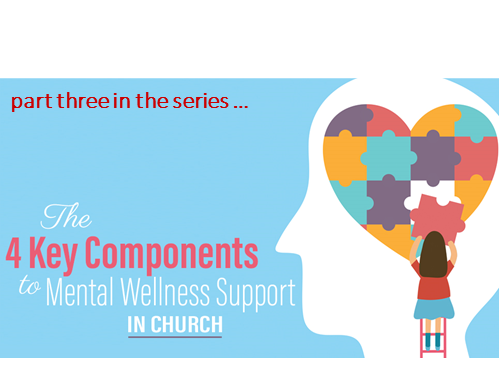
Taste and See God’s Goodness: The Jackson Willms Story
As I glanced out the front window and watched Jackson Willms and his care aide make their way up the...
Join us online at 9:00 am and 11:00 am Watch Online

In the first post in this series, I mentioned that we have currently simultaneous epidemics of obesity, diabetes and depression. This is NOT a coincidence! These conditions have multiple underlying hormonal imbalances in common:
These hormonal imbalances combine to create a state of generalized inflammation in the body. Researchers now state that inflammation is the root cause of most chronic diseases, everything from arthritis to heart disease, and cancer to dementia.
Key point: an inflamed brain is a depressed and anxious brain!
Let’s look at what it is about our modern lifestyle that causes our hormones to go out of whack.
How Diet Affects our Bodies
Our standard American diet (you might want to note the acronym spells “SAD”) is very high in processed foods and sugar, and low in whole foods and nutrients. This leads to a paradox: although two thirds of the adult population is either overweight or obese, the majority of people are also nutritionally deficient!
Food Processing
What is food processing, really? Most commonly, processing involves peeling off the outer layers of fruits, vegetables and whole grains. This then removes many plant nutrients (or phytochemicals) and fiber. Processing can also involve heating and drying – which frequently destroys vitamins, minerals and enzymes. One thing processed food is typically very high in is starch. (It’s also usually high in unhealthy fats, but that’s another discussion.) Think of starch as a chain of sugar molecules that can be very rapidly broken down and absorbed. This then causes a spike in blood sugar, which leads to an elevation in insulin levels.
Insulin
Consider insulin a “transporter” hormone. It allows glucose (the name for the basic sugar molecule) to go from the bloodstream, through the cell walls and into the cells.
Only when glucose is in the cells can it be used by our tissues for energy. Now, you might be thinking, “Well then lots of extra glucose just means I’ll have lots of extra energy, right?” Wrong.
Our systems were designed to function optimally within certain parameters.
That’s right, high insulin levels are inflammatory!
Oh, and all the sugar that created the high glucose and high insulin levels? That’s directly inflammatory as well. So it’s a double whammy. Remember, an inflamed brain is a depressed and anxious brain!
Whole Food
The best thing you can do for your brain is to eat whole food – that’s food as God created it. Avoid the centre aisles in the grocery store which is where the most processed and highest added-sugar items are typically located.
Keep in mind that up to 80% of packaged items in the grocery store contain added sugar. If you don’t believe me, check out food labels. Just one example: a small container (110 ml) of fruit yogurt can contain up to 4 teaspoons of sugar – which is about two-thirds of the recommended daily amount for women!
Our Sleep Cycle, Devices and Stress Hormones
The artificial light from screens – especially in the evenings – disrupts the production of our sleep hormone melatonin. Enter disrupted sleep, fatigue and low energy. Sleep disruption then has the hormonal consequence of elevating stress hormones.
Other parts of our modern lifestyle also increase stress hormone levels – the constant rushing, the noise, the deadlines. The most notorious is multi-tasking. Think you don’t multi-task? Well, if you use a smartphone or mobile device, chances are you do.
The very way devices are set up – notifications, hyperlinks, all the apps that pop up on your screen as you unlock your phone – is a recipe for distraction.
Lifehacks to Combat Stress
Do yourself a favor – bookend your day with screen-free time. And, while this may sound corny, go back to an old-school alarm clock. Keeping your phone out of your bedroom could be your ticket to a rested, refreshed life.
What about physical activity? (Yes, you knew the topic of exercise was coming.)
Not only does exercise decrease stress hormone levels, help regulate blood sugar and lower insulin, it also leads to the production of a special protein called BDNF or brain derived neurotrophic factor. BDNF is like Miracle Gro for the brain! It acts like fertilizer for brain cells, helping them grow, develop more connections and perform better.
How much or how intense does the exercise have to be to create such amazing change?
Thirty minutes of brisk walking, three days a week. Not a 10 K run. Not a marathon training session with sweat pouring off you. Just note that the walking does have to be continuous, as well as brisk. The casual “sniff and sprinkle” stroll with the dog doesn’t count.
Uncertain how to start changing your lifestyle?
If all this change sounds intimidating or overwhelming, consider checking out Vibrant Life Ministry’s Mood Mastery program.
Not only is there more education on all the lifestyle elements, there’s practical tips, strategies and support from others who are on the same journey.
Feel free to contact me with any questions at drczeg@gmail.com.
Magda Czegledi has a unique perspective on mental health issues through her experience as a family doctor, a family member and as a patient. While experiencing a depression so severe she had to leave her family practice, she later recovered through a combination of her growing faith in Christ and basic lifestyle change. Currently, works as a speaker, small group facilitator and peer support trainer.

As I glanced out the front window and watched Jackson Willms and his care aide make their way up the...

Several years ago, Pastor Blair Butterfield was at a pastors’ conference in Lima, Peru where he bumped into a man...

The world tells us we can do it all. Try hard enough, work enough hours, do all the right things...